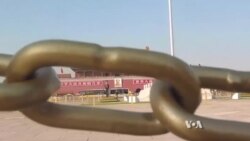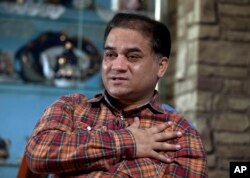China’s communist leaders will host a high level political meeting this week, called the Fourth Plenum, and for the first time in the party’s history, rule of law will be a key item on the agenda.
Analysts and Chinese media reports said the meetings could see the approval of long-awaited measures aimed at giving courts more independence and include steps to enhance an already aggressive and high-reaching anti-corruption drive.
Chinese state media said a key aim of the meetings of the party’s Central Committee, a group of more than 200 top officials, was to raise the quality and effectiveness of China’s one party rule. One thing that is less clear, however, is whether the meetings will address concerns about how the party remains above the law.
Party above the law
The fate of former national security chief Zhou Yongkang, the highest ranking official yet to be targeted in the government’s anti-corruption campaign, will be a key development to watch during the meetings.
It is widely expected that Zhou, who ran China’s Public Security Ministry from 2002 to 2007 and rose to become a member of the party's powerful politburo standing committee before retiring, will be formally expelled from the party during the meeting.
However, the investigation of Zhou and scores of other party officials has been first conducted by the Communist Party.
And that’s the current reality in China, said He Jiahong, a legal scholar at Beijing’s Renmin University. He said that while the government's legal offices, such as the People’s Procuratorate, should be the ones going after corrupt officials - especially high-ranking ones - it was instead the party and its disciplinary inspection team that took the lead.
“The party’s disciplinary inspection commission officers have more power. So they will have more effective investigations, but they are working outside of the legal framework,” He said. “They are not criminal investigators working in accordance with a criminal investigation law.”
He said that while this was not the right way to go about tackling corrupt officials, it was all that can be done for the moment; adding that he hoped the meetings next week would put things in the right framework. One proposal that could help do that is a measure to centralize and streamline anti-corruption offices within the People's Procuratorate.
Legal scholar Cheng Guangzhong said the upcoming meetings would be a chance to put more constraints on power, something that could help prevent corruption.
"To rule a country in accordance with the law, first and foremost you need to rule in accordance with the constitution and emphasize that the Communist Party as the party in power, must operate within the constraints of the constitution and the law, emphasize using the law to restrict power," Cheng said.
Since Xi Jinping took over as head of the Communist Party nearly two years ago, more than 50 high-ranking officials have faced charges. China’s communist leaders have said the fight against corruption is a life or death struggle not only for the country, but the party as well.
The Chinese public has grown increasingly dissatisfied with official graft and abuse of power. Corruption among China’s leadership has also led to wide range of social problems that threaten the party’s rule and stability.
Silencing dissent
But as China’s leaders gather to discuss rule of law, the country’s ruling party is working tirelessly to silence dissent in the name of stability. In recent weeks, more than 60 people have been detained across the country for showing support of the ongoing pro-democracy protests in Hong Kong.
Last month, ethnic Uighur scholar was sentenced to life in prison for expressing his views about China’s western region of Xinjiang. Authorities said Tohti was preaching violence and promoting separatism. His supporters said he sought to build understanding between China’s Han majority and Uighurs.
The role China’s constitution will play in discussions next week will also be a key topic to watch. China’s constitution enshrines the right to freedom of speech, the press and assembly, and even the right for citizens to vote and run for election.
Shortly after Xi Jinping came to office, he gave a speech in which he said that “no organization or individual has the privilege to overstep the constitution and the law.”
Critics said his actions since then, such as the growing number of arrests of dissidents, have raised questions about his commitment to that principle.
Legal scholar He Jiahong said preventing wrongful convictions and improving the judicial independence of local courts was one way the meeting would seek to improve rule of law. But the reforms will have to come from the bottom up, starting with local city and county courts.
“In fact the [local courts] are all basically controlled by local party leaders because their money comes from the local government,” He said. “Their appointments were made by the local party leader, so the judiciary cannot make decisions independent from the interference of local leaders.”
He said what was expected to be approved during the meeting is a proposal that would give provincial authorities the responsibility of controlling appointments to local courts and their purse strings.
People's Livelihood
Just days before the meetings began VOA went out on the streets in Beijing to see what residents’ expectations were for the fourth plenum. Some were blunt and said they do not expect the meeting to make any difference, while others hoped authorities would use the experiences of other countries.
Beijing resident Sun said she’s optimistic.
“Improving the legal system will take time though. I hope this can be done step by step, little by little,” she said. “I also hope we can learn from other countries successful experiences and make some real change.”
While no one mentioned the proposed changes to the court system, some spoke of the need to tighten restrictions for the environment.
“The government has not done enough to improve the smog problem or the traffic situation in the city,” said one resident surnamed Yu. “During the upcoming APEC (Asian Pacific Economic Cooperation) meetings the government has called for restricting cars based on the last number of their license plates. I think that is something that should be put into effect all the time.”
Another resident, surnamed Xiao said people in China are living in a society that feels surreal. She said the government should press onward with its anti-corruption drive.
“I think rule of law should guarantee people can live healthy lives and maintain order so people can have more hope for the future,” Xiao said.
Reuters also contributed to this report.







